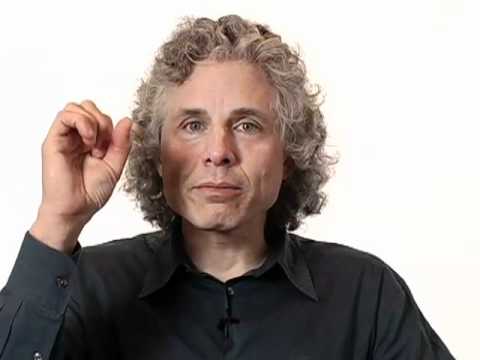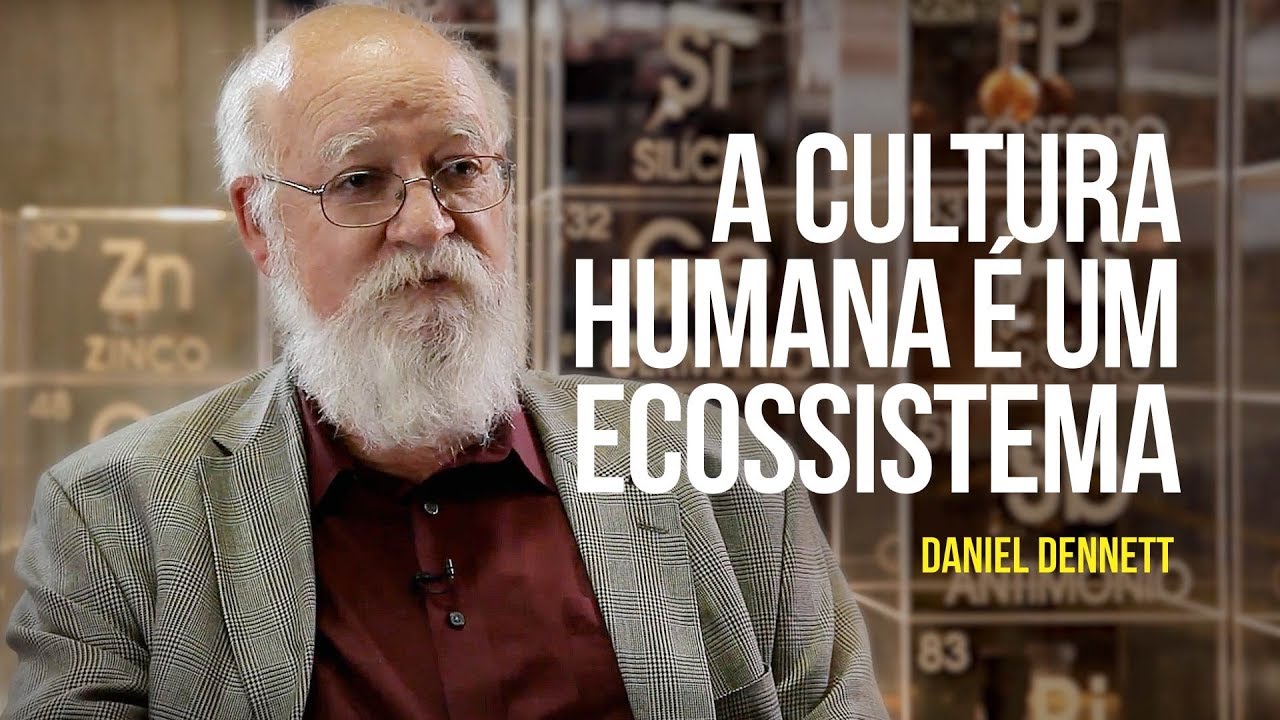Big Think
http://bigthink.com
There’s no such thing as free will in the sense of a ghost in the machine; our behavior is the product of physical processes in the brain rather than some mysterious soul, says Pinker.
Check out the rest of Steven Pinker’s interview at http://bigthink.com/stevenpinker
Question: What is free will?
Steven Pinker: I don’t believe there’s such a thing as free will in the sense of a ghost and a machine, a spirit or a soul that somehow reads the TV screen of the senses and pushes buttons and pulls the levers of behavior. There’s no sense that we can make of that. I think we are . . . Our behavior is the product of physical processes in the brain. On the other hand, when you have a brain that consists of one hundred billion neurons connected by one hundred trillion synopses, there is a vast amount of complexity. That means that human choices will not be predictable in any simple way from the stimuli that I’ve hinged on beforehand. We also know that that brain is set up so that there are at least two kinds of behavior. There’s what happens when I shine a light in your eye and your iris contracts, or I hit your knee with a hammer and your leg jerks upward. We also know that there’s a part of the brain that does things like choose what to have for dinner; whether to order chocolate or vanilla ice cream; how to move the next chess people; whether to pick up the paper or put it down. That is very different from your iris closing when I shine a light in your eye. It’s that second kind of behavior — one that engages vast amounts of the brain, particularly the frontal lobes, that incorporates an enormous amount of information in the causation of the behavior that has some mental model of the world that can predict the consequences of possible behavior and select them on the basis of those consequences. All of those things carve out the realm of behavior that we call free will, which is useful to distinguish from brute involuntary reflexes, but which doesn’t necessarily have to involve some mysterious soul.
Question: What is free will?
Steven Pinker: I don’t believe there’s such a thing as free will in the sense of a ghost and a machine, a spirit or a soul that somehow reads the TV screen of the senses and pushes buttons and pulls the levers of behavior. There’s no sense that we can make of that. I think we are . . . Our behavior is the product of physical processes in the brain. On the other hand, when you have a brain that consists of one hundred billion neurons connected by one hundred trillion synopses, there is a vast amount of complexity. That means that human choices will not be predictable in any simple way from the stimuli that I’ve hinged on beforehand. We also know that that brain is set up so that there are at least two kinds of behavior. There’s what happens when I shine a light in your eye and your iris contracts, or I hit your knee with a hammer and your leg jerks upward. We also know that there’s a part of the brain that does things like choose what to have for dinner; whether to order chocolate or vanilla ice cream; how to move the next chess people; whether to pick up the paper or put it down. That is very different from your iris closing when I shine a light in your eye. It’s that second kind of behavior — one that engages vast amounts of the brain, particularly the frontal lobes, that incorporates an enormous amount of information in the causation of the behavior that has some mental model of the world that can predict the consequences of possible behavior and select them on the basis of those consequences. All of those things carve out the realm of behavior that we call free will, which is useful to distinguish from brute involuntary reflexes, but which doesn’t necessarily have to involve some mysterious soul.
Source




Pinker refutes a mystical free will but evades man's direct, immediate contact and control over his mind. That is the base of scientific method, ie, a method of using ones mind. Determined animals dont think about and debate scientific method. Free will is the direct power to focus or evade.
this kind of narrative is sounding very jaded 7 years on…
Science without spirituality is blind, just as spirituality without science is devoid of reason.
Free will is the will to be free. And to be free you need the will of Christ to set yourselves apart from a robotic controlled doctrine that intelligent people spew out. 98% of the world's population always believed in a God Why ??? Where did this desire come from ??? So many religions and each look to a creator irespective of their doctrines. WHY I ASK ..???? MAN IS ALWAYS SEARCHING FOR A CREATOR TO EASE HIS MIND BODY AND SOUL . is this by chance that almost every human being has this quest. I think not I really do
Now, let's imagine we actually had free will and the choice between a cup of coffee or tea.
If I chose coffee, Steven would say I am determined to do so, but if I chose tea he would say the same.
There is nothing I can do, where Steven wouldn't say that, which makes me think we have no method of actually detecting free will, even if it existed.
Free will…another way for a Christian to smuggle in another imaginary force acting on their lives. Christians enjoy not having responsibility. Hand it all to your imaginary self. The devil made me do it…it was gods will…grow up.
Lets just call it 'will' then. No need to add the 'free' part, which all it does is create confussion. It's even shorter!
Natural Law is the deterministic, unchangeable factor of the universe, while free will is the chaotic, random factor. The chinese express this through the Yin-Yang (which has many, many layers of meaning) and in order to even perceive and 'see' it for what it is, you have to literally align yourself with nature in a way that allows you to think both irrationally using intuition AND rationally using intellect.
Determinism is simply the result of an overly materialistic, rational thinking mind, while the opposite (generally relativism or nihilism) is an obsession with the random, chaotic side of the universe and is rooted in irrationality and feeling, rather than thought. Neither is greater, better, or more useful than the other, they are literally two sides to the same coin.
Abandon naive ideological dead-ends forced on you by society, and study the true science of nature and self-mastery, alchemy.
But, if someone did shine a light in your eye, you still have the choice on whether to close it or not. Reflex is still controlled technically.
There is no machine. There is only the ghost.
Free will is simple. It just means any behaviour that is not forced upon you by others but are the result of your own choices.
Being manipulated without being aware of it can be considered a grey area, but free will doesn't have to be a 24/7 thing.
I've never heard an argument against free will which as not a formal fallacy. This video is no exception.
This is nonsense. Your action is the outcome of your inner and outer condition there is not such thing as free will.
or let's say this way: your action is either based on causality or Sheer accidence. Therefore your action is either determinate or random,
The complexity of the brain has nothing to do with free will.no matter how much mind is complex your action is the outcome of what happens in your brain.its true that you can not predict it and maybe it is unpredictable.but definitely it has nothing to do with freewill.
the concept of free will is merely is a myth that humankind want to deceive himself with it.
Some parts of our culture like to think see the soul as the ghost in the machine mentioned by Steve here and think of it as something common to all religion but that's not the only conceptual model about it. There's also a way of thinking and talking about it in which the soul is more like a synonym for the whole person holistically and which the body, spirit, etc. aren't separate components that a human being is built out of but names for different perspectives for looking at a human through like looking at ourselves as animals or through what separates us from other animals for example. There are scholarly works which go through the histories of the use of these words and compare how they were used in different eras of different cultural traditions and it becomes rather clear that for example the Jesus of the texts of the New Testament plus most of the Old Testament texts don't use the word soul and spirit in the way common nowadays to Western Christian and secular popular culture but in the more holistic way outlined above. Just saying.
I cant make sense of your choice in hairdo
In other words, he doesn't know
Getting a lazy teenager to clean his room is really hard!! I wonder how I can re-program him through cause and effects into cleaning his room by eliminating his "imaginary free will" to my advantage. Does anyone know? If not.. does that mean I have no choice but to kick him out or live with it? Are there more options? What has the universe decided for me??? Arghhhh… lol.
Free Will (or the illusion thereof) is a byproduct of consciousness. Since consciousness still is a mystery, we can't really target this issue yet…
For someone who does not believe in a Supernatural eternal free will, Steven Pinker nonetheless espouses a faith. In fact he MUST assume that he himself has the very thing (i.e free will), that he's vainly attempting to deny.
Hence he has to smuggle in the notion of free will, just to expect that his line of reasoning (inherent his denial) can withstand any rational epistemology.
I HAVE FREE WILL IM FAPPING TO A HOLOCAUST MOVIE RIGHT NOW ! YOU CANT PROGRAM SHIT LIKE THAT.
You tell em' Steve
The Determinist Pinker makes a video to convince others why free will is an illusion but never pauses to ask, why bother?
does he have to ah uhm aaah so much when he speaks?
Why Stevens argument is logically inconsistent …
A: Did Steven freely come to the conclusion that free will doesn't exist based on a conscious evaluation of the data..?
B. Was Stevens brain determined to believe free will doesn't exist..?
In other words: If determinism/compatibilism is true, rational evaluation is an illusion and has no causal powers. Why? On determinism the brain is forced by chemistry and physics (universal causation) to hold a belief whether it is true or not. Hence on determinism we have no rational justification for our beliefs.
1. A brain is like a rock bouncing down a hill.
2. The rock: Hmmm… should I go left or right (illusion of evaluation)…
3. Universal causation makes the rock go left.
4. The rock: I choose to go left (illusion of conclusion/choice).
In other words: As a determinist/compatibilist Steven cannot logically argue against the existence of free will using rationality — but this is what he does. Right..? If he would like to be logically consistent he would have to say: "Perhaps free will does not exist. I don't know."